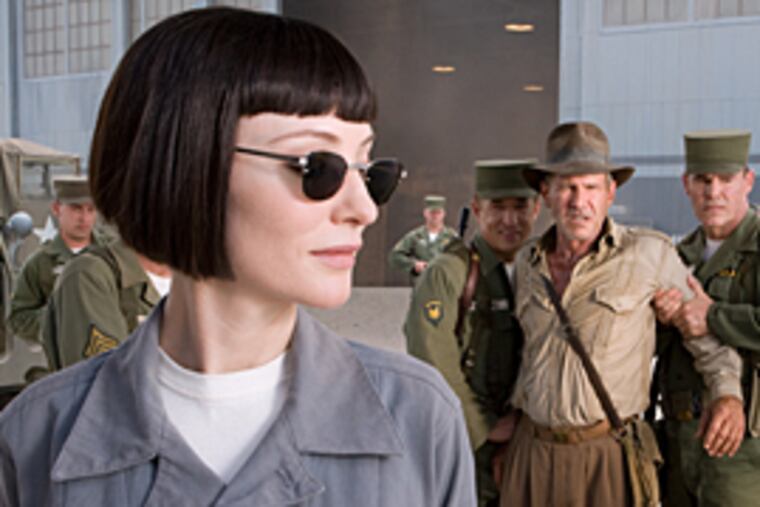The end for Indiana Jones
Gary Thompson: Harrison Ford may be 65, but not to worry - it's clear in "Indiana Jones and the Kingdom of the Crystal Skull" that his stuntman is only 25.

Harrison Ford may be 65, but not to worry - it's clear in "Indiana Jones and the Kingdom of the Crystal Skull" that his stuntman is only 25.
In the first few minutes alone, Indy dodges a thousand bullets, swings from the rafters via his famous rawhide whip, and outruns the shock wave from an atom bomb.
The year is 1957, the bomb is a military test in New Mexico, and none of this is by happenstance.
Steven Spielberg has come to praise Indiana Jones and also to bury him, and so he positions Indy's swan song in the mid-1950s - the moment when the United States made the pivot from a nation that built its mythology around a heroic past to a nation whose atomic age imagination was fixed on the future.
Indy belongs to the past (Spielberg drew his inspiration from the adventure serials of the 1930s), as his very occupation, archaeologist, suggests. The '60s are just around the corner and now, like the stuff he pulls out of the earth, he's a relic.
There is no place in the future for the snap brim hat. Even the villains are new - out with the Nazis, in with the Cold War and the KGB. A Russian agent (Cate Blanchett, drawing her accent from Natasha in "Rocky and Bullwinkle") has kidnapped Indy, and forced him to provide the location of a mysterious mummy stored in a government warehouse (the same one, by the looks of things, that houses the Ark of the Covenant).
The heroes are new, too - Indy acquires an adventure-seeking apprentice named Henry (Shia LaBeouf) who shows up wearing Marlon Brando's duds from "The Wild One," and riding his motorcycle.
Elderly Indy's merely a passenger when they dodge the KGB and make their way, eventually, to South America, where Indy helps Henry rescue a missing professor (John Hurt) who holds the location to a valuable artifact sought by the Soviets.
It's a running joke in the movie that Hurt's character suffers from come-and-go dementia. We suspect there's method to his madness, that underneath it all, the old guy knows what he's doing.
The same spirit seems to have motivated Ford, Spielberg, and producer George Lucas. Their movie is one big wink at the baby boomer audience, full of jokes about creaky bones, and just as full of determination to show that they can still get it done.
And for a while, they do. The opening action salvos are fun, and so is Ford's on-camera reunion with Karen Allen, displaying the spunk that made her unforgettable in "Raiders of the Lost Ark."
In the end, though, "Crystal Skull" feels too much like a retrospective. The movie is a race through the jungle to find ancient ruins that hold the secret to the achievements of pre-Columbian civilizations - hokum borrowed from the old "Chariots of the Gods" books.
It's obviously b.s., but it allows Spielberg to resurrect images from virtually every popcorn movie he's ever made, from "Close Encounters" to "E.T." to "War of the Worlds." All that's missing is a T. Rex.
In the end, though, you want "Crystal Skull" to have its own reason for being, some way to generate its own new excitement.
Instead, what we get is an ending that descends further into wackiness, and it left me feeling unaccountably impatient. Peevish, even.
I mean, you have to feel sorry for the Inca and Mayans. They get wiped out by conquistadors and smallpox, and then, centuries later, we besmirch them as cultures too backward to have built their own temples, irrigated their own land, or even made their own large-scale figurative art.
Also, at the risk of sounding like one of those sour-grapey Clinton people, the movie's attitude toward women seems a little backward. Professor Jones is rightly appalled that young Henry dropped out of school, and insists he return to complete his education. But when a woman's driving ambition is revealed to be a thirst for knowledge, she gets her flesh melted. You'll find more progressive stuff in Genesis.
Mostly, though, I was disappointed that Spielberg found no way to ground the movie's long-winded resolution in his characters.
Instead, it's one of those monumental special effects extravaganzas that seem to thrill only the CGI artists who make them and the filmmakers who pay so much money for them.
Look, say Spielberg and Lucas, isn't this awesome?
The answer, guys, is no. It's on the dull side. We're hip to computer graphics, and we're over it. We'd much rather see what Ford can still do with his rawhide whip. *
Produced by Frank Marshall, directed by Steven Spielberg, written by David Koepp, music by John Williams, directed by Paramount Pictures.